 W
WAgainst All Enemies: Inside America's War on Terror (ISBN 0-7432-6823-7) is a 2004 award-winning book by former U.S. chief counter-terrorism advisor Richard A. Clarke, criticizing past and present presidential administrations for the way they handled the War on Terrorism. The book focused much of its criticism on President George W. Bush, charging that he failed to take sufficient action to protect the country in the elevated-threat period before the September 11 attacks and for the 2003 invasion of Iraq, which Clarke feels greatly hampered the War on Terrorism. The book's title comes from the oath of office taken by all U.S. federal officials, in which they promise to defend the Constitution "against all enemies, foreign and domestic."
 W
WAmerica Right or Wrong: An Anatomy of American Nationalism is a 2012 book by the British author and academic Anatol Lieven. A separate, earlier version was published in 2004.
 W
WThe Assault on Reason is a 2007 book by Al Gore which brands conservatives as "enemies of justice and truth" engaged in a "systematic attack on the role of reasoned debate in policy and public life" in America. In the book, the former U.S. Vice President heavily criticizes the George W. Bush administration for its actions in furthering the "assault on reason". He argues that there is a trend in U.S. politics toward ignoring facts and analysis when making policy decisions, calling the Congress, the judiciary, and the press complicit in the process. Gore's prescription is that the average citizen must be proactive in "restoring democracy". He expresses hopes that the medium of the Internet will supersede television and what he argues is its inherent bias, creating a "marketplace of ideas" that has not been present since the replacement of the printed word with mass media.
 W
WAt the Center of the Storm: My Years at the CIA is a memoir co-written by former Director of the Central Intelligence Agency George Tenet with Bill Harlow, former CIA Director of Public Affairs. The book was released on April 30, 2007 and outlines Tenet's version of 9/11, the War on Terrorism, the 2001 War in Afghanistan, the run-up to the 2003 Iraq war, rough interrogation and other events.
 W
WBush at War is a 2002 book by The Washington Post reporter Bob Woodward recounting President George W. Bush's responses to the September 11 attacks and his administration's handling of the subsequent War in Afghanistan.
 W
WBush in Babylon is a book by the historian Tariq Ali, that attacks the 2003 invasion of Iraq. The book comprises two parts, the first being a modern history of Iraq, the second a condemnation of the 2003 invasion. Ali uses poetry and critical essays to express his ideas.
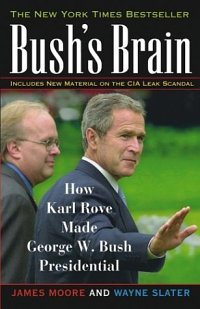 W
WBush's Brain: How Karl Rove Made George W. Bush Presidential is a book by James Moore and Wayne Slater that chronicles the political career of Karl Rove and the role he has played in the elections of George W. Bush, both when running for Governor of Texas and for president. It was published in 2003 by John Wiley & Sons, Inc. ISBN 0-471-47140-2.
 W
WA Charge to Keep is a 1999 book written by then-Governor of Texas George W. Bush, with a foreword by Karen Hughes. Later editions have the sub-title My Journey To The White House.
 W
WDead Certain: The Presidency of George W. Bush is a 2007 book by Robert Draper. The book tells the story of the George W. Bush Administration from 2001 to 2007.
 W
WDecision Points is a memoir by former U.S. President George W. Bush. It was released on November 9, 2010, and the release was accompanied by national television appearances and a national tour. The book surpassed sales of two million copies less than two months after its release, breaking the record previously held by former President Bill Clinton's memoir My Life. Decision Points also opened at #1 on the New York Times bestseller list.
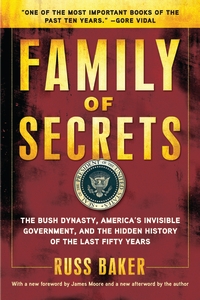 W
WFamily of Secrets is a book by Russ Baker. Published by Bloomsbury Press in 2008, the book describes alleged connections between the Bush family and the Central Intelligence Agency. The book asserts that President George H.W. Bush was linked to the Watergate scandal and the assassination of John F. Kennedy.
 W
WThe Family: The Real Story of the Bush Dynasty is an unauthorized biography of the Bush family by the American investigative journalist Kitty Kelley. It was published on September 14, 2004, less than two months before the 2004 US Presidential election. Reviews of the book were mixed, with some of the "accusations," according to The New York Times, "[standing] up better than others."
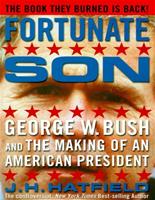 W
WFortunate Son is a controversial biography of the former American president George W. Bush by J.H. Hatfield. The book was published in 1999 during the run-up to Bush's candidacy in the United States 2000 presidential election by St. Martin's Press, and retracted by the publisher.
 W
WHouse of Bush, House of Saud: The Secret Relationship Between the World's Two Most Powerful Dynasties is a 2004 book by Craig Unger that explores the relationship between the Saudi Royal Family and the Bush extended political family. Unger asserts that the groundwork for today's terrorist movements and the modern wars that have sprung up about them was unintentionally laid more than 30 years ago with a series of business deals between the ruling Saudis and the powerful Bush family. The Saudis received investments and military protection in exchange for cooperation on lucrative oil deals. The author claims that the result has been a shady alliance between "the world's two most powerful dynasties." Unger writes, "Never before has an American president been so closely tied to a foreign power that harbors and supports our country's mortal enemies."
 W
WIn My Time: A Personal and Political Memoir is a memoir written by former Vice President of the United States Dick Cheney with Elizabeth Cheney. The book was released on August 30, 2011 and outlines Cheney's accounts of 9/11, the War on Terrorism, the 2001 War in Afghanistan, the run-up to the 2003 Iraq war, enhanced interrogation techniques and other events. According to Barton Gellman, the author of Angler: The Cheney Vice Presidency, Cheney's book differs from publicly available records on details surrounding the NSA surveillance program. Cheney discusses his both good and bad interactions with his peers during the Presidency of George W. Bush.
 W
WKnown and Unknown: A Memoir is an autobiographical book by Donald Rumsfeld, an American politician and businessman who served as Secretary of Defense from 1975 to 1977 and again from 2001 to 2006. He published it through Penguin Group USA in February 2011. It covers a variety of his experiences such as working as a Republican in the U.S. House in the late-1960s, serving in the Ford Administration during the Watergate and Vietnam crises, and serving during the George W. Bush Administration through the Abu Ghraib and Guantanamo Bay scandals.
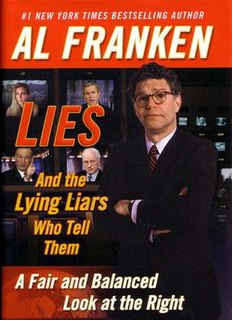 W
WLies and the Lying Liars Who Tell Them is a satirical book on American politics by Al Franken, a comedian, political commentator, and politician. It was published in 2003 by Dutton Penguin. Franken had a study group of 14 Harvard graduate students known as "TeamFranken" to help him with the research. The book's subtitle, A Fair and Balanced Look at the Right, is a parody of Fox News' tagline "Fair and Balanced." FNC sued Franken over the use of the phrase in a short-lived and unsuccessful lawsuit, which has been credited with increasing the sales of the book, an example of the Streisand effect.
 W
WThe Madness of King George: The Ingenious Insanity of Our Most "Misunderestimated" President is a political satire book written by Michael K. Smith and illustrated by Matt Wuerker. It was published in 2004 by Common Courage Press in Canada. Alternating between text and cartoons, it takes a critical look at George W. Bush's life and first term as president of the United States, portraying it all as a rush to war in Iraq.
 W
WThe Mirage is an alternate history novel by Matt Ruff, published in 2012 by Harper. The book centers around Mufasta, Samir, and Amal, agents of Halal, an organization of the United Arab States, a Middle Eastern version of the United States. They discover artifacts of our world and begin a quest to discover the truth.
 W
WBush on the Couch: Inside the Mind of the President is a 2004 book by psychoanalyst Justin A. Frank. The central premise of Frank's book is that President George W. Bush displays signs of poor mental health which makes him ill-suited to rule the United States. Frank suggests Bush suffers from megalomania, that he is probably incapable of true compassion and shows signs of sadism, and that as an untreated alcoholic, is in constant danger of a relapse. Further, in Frank's opinion, Bush manifests the symptoms of a "dry drunk", principally irritability, judgmentalism and a rigid, inflexible world view. Frank also analyses, among other things, Bush's tendency to mix up his metaphors and concludes Bush has substantial problems with abstract, flexible thinking.
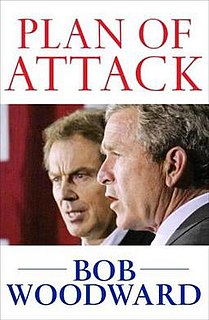 W
WPlan of Attack is a 2004 book by the American author and investigative reporter Bob Woodward. It was promoted as "a behind-the-scenes account of how and why President [George W.] Bush decided to go to war against Iraq".
 W
WA Pretext for War: 9/11, Iraq, and the Abuse of America's Intelligence Agencies is a 2004 book by journalist James Bamford that takes a highly critical view of the events around 9/11 and the subsequent Iraq War.
 W
WThe Price of Loyalty: George W. Bush, the White House, and the Education of Paul O'Neill, is a 2004 book by Pulitzer Prize-winning author Ron Suskind. The book was the first to provide critical insight into the events that led up to the Iraq War. The Price of Loyalty was met with both commercial and critical success, and was the first book by Suskind to be a #1 New York Times best-seller.
 W
WThe Prosecution of George W. Bush for Murder is a 2008 book by Vincent Bugliosi, a former prosecutor in Los Angeles. He argues that President George W. Bush took the United States into the invasion of Iraq under false pretenses and should be tried for murder for the deaths of American soldiers in Iraq.
 W
WSecond Chance: Three Presidents and the Crisis of American Superpower is a 2007 book by Zbigniew Brzezinski, who was President Carter's National Security advisor and a scholar of American foreign policy as a professor at the School of Advanced International Studies at Johns Hopkins University. The book discusses the 15 years of American foreign policy where the U.S., emerging as the "victor" in the Cold War, has been the lone "superpower." Brzezinski writes about how United States presidents George H. W. Bush, Bill Clinton, and George W. Bush have demonstrated leadership and wielded power throughout a decade and a half as the leaders of a virtually unchallenged world power.
 W
WState of Denial: Bush at War, Part III (ISBN 0-7432-7223-4) is a book by Bob Woodward, originally due to be published October 2, 2006, that examines how the George W. Bush administration managed the Iraq War after the 2003 invasion. It follows Woodward's previous books on the Bush administration, Bush at War and Plan of Attack. Based on interviews with a number of people in the Bush administration, the book makes a number of allegations about the administration.
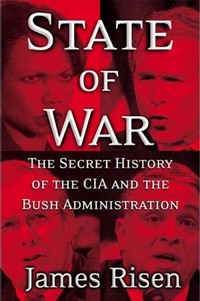 W
WState of War: The Secret History of the CIA and the Bush Administration is documentary review written by Pulitzer Prize-winning American journalist for The New York Times James Risen. The book was released on January 3, 2006.
 W
WStupid White Men ...and Other Sorry Excuses for the State of the Nation! is a book by American filmmaker Michael Moore published in 2001. Although the publishers were convinced it would be rejected by the American reading public after the September 11 attacks, it spent 50 consecutive weeks on New York Times Best Seller list for hardcover nonfiction and went to 53 printings. It is generally known by its short title, Stupid White Men.
 W
WTerror and Liberalism is a non-fiction book by American political philosopher and writer Paul Berman. He published the work through W. W. Norton & Company in April 2003. Berman asserts that modern Islamist groups such as al Qaeda share fundamental ideological elements with fascism and other 20th-century Western totalitarian movements, and he defends an assertive approach to root out this extremist thinking across the world. He details the appeal of violent terror, going back to Albert Camus' work The Rebel, first published in 1951. Berman hypothesizes that the spread of democracy in the Arab world, while highly difficult and involving a long struggle, is a fundamentally just cause, and he writes in support of the George W. Bush administration's foreign policies while also faulting President Bush for credibility problems and incompetence.
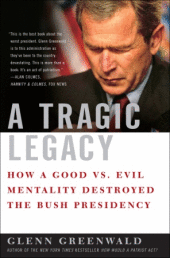 W
WA Tragic Legacy: How a Good vs. Evil Mentality Destroyed the Bush Presidency is a New York Times bestselling book by author, attorney, blogger, and Salon.com columnist Glenn Greenwald published on June 26, 2007, by Crown Publishing Group, a division of Random House.
 W
WWar on Iraq: What Team Bush Doesn't Want You to Know is short book, written in 2002, by William Rivers Pitt and featuring an extensive interview with former United Nations weapons inspector Scott Ritter. In it Pitt and Ritter examine the Bush administration's justifications for war with Iraq and call for a diplomatic solution instead of war. Ritter argues that Iraq once possessed many unconventional arms but they have either been destroyed or degraded. Therefore, the government's claims that Iraq had vast stockpiles of "weapons of mass destruction" were "shaky at best." In reviewing this book, The Guardian called it "the most comprehensive independent analysis of the state of knowledge about Iraq's weapons programmes until the new team of inspectors went back." Along with another book published by Context Books, The New York Times singled out War on Iraq: What Team Bush Doesn't Want You to Know as an anti-war book that "emerged from, and then codified opposition to the war in Iraq."
 W
WThe War Within: A Secret White House History (2006–2008) is a non-fiction book by Washington Post reporter Bob Woodward that was released by publisher Simon & Schuster on September 8, 2008. It is the fifteenth book written by Woodward, the fourth in a series of books about President George W. Bush and his administration's foreign policy including Bush at War, Plan of Attack, and State of Denial. The book discusses the debate within the administration about the controversial Iraq "surge" strategy implemented in 2007. Simon & Schuster editor Alice Mayhew said in an official statement that "There has not been such an authoritative and intimate account of presidential decision making since the Nixon tapes and the Pentagon Papers. This is the declassification of what went on in secret, behind the scenes."
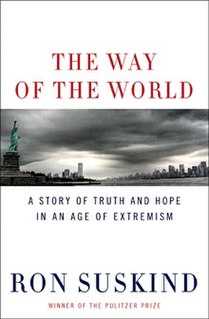 W
WThe Way of the World: A Story of Truth and Hope in an Age of Extremism is a 2008 non-fiction book by Ron Suskind, claiming various actions and policies of the George W. Bush administration. Most notably, it alleges that the Bush administration ordered the forgery of the Habbush letter to implicate Iraq as having ties to al Qaeda and the hijackers in the September 11 attacks. All these claims have been strenuously denied by the White House and all parties involved. The book, published on August 5, 2008, by Harper, met mixed reviews but received considerable media attention and created controversy.
 W
WWhat Happened: Inside the Bush White House and Washington's Culture of Deception is an autobiographical bestseller by Scott McClellan, who served as White House Press Secretary from 2003 until 2006 under President George W. Bush. The book was scheduled to be released on June 2, 2008; however, excerpts were released to the press a week before publication. The book quickly became a media sensation for its candid, insider's critique of the Bush administration and ran as a leading story on most top news outlets days after the content became public. It was listed as a number-one bestseller by the New York Times and on Amazon.com when it first went on sale.
 W
WWorse than Watergate: The Secret Presidency of George W. Bush is a 2004 book by author and Watergate figure John W. Dean. Dean criticizes the secrecy employed by US President Bush and his Vice-President Dick Cheney, depriving citizens of the ability to make informed decisions, and draws parallels with the government of US President Richard Nixon for whom he served as legal counsel. He also draws attention to potentially serious issues that, as of 2004, had been given a low profile in the US media. In particular, he notes that the 18 March 2003 presidential determination, a condition of the legislation which authorized the 2003 invasion of Iraq, failed to satisfy the terms imposed by Congress and consequently would justify impeachment.